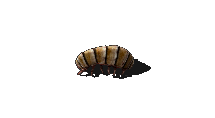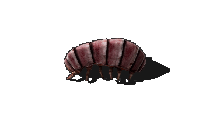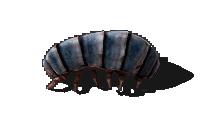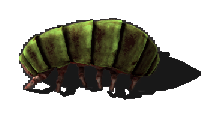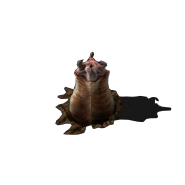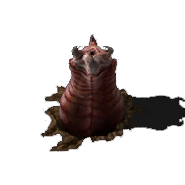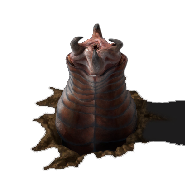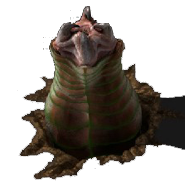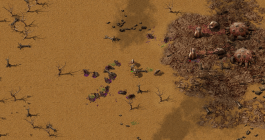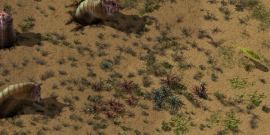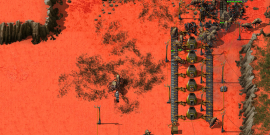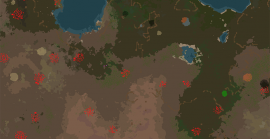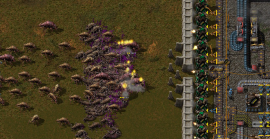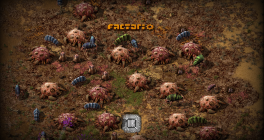敵
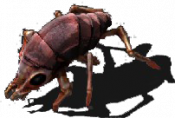
敵(またはバイター)は、プレイヤーを傷つけようとする生物である。 彼らは有機的な巣に住み、互いに平和的に共存している節足動物の形をした地球外世界の原住民である。彼らは3つの種に分類される。バイター、スピッター、ワームである。種はさらに4つの成長段階、つまり強さで区別される。敵や巣はマップ上に赤い点で表示される。プレイヤー同様、敵も徐々に体力を回復していく。
実績
Enemies are directly connected to the following achievements:

|
It stinks and they don't like it |

|
ローラー作業 10個の巣を自動車や戦車の衝突で破壊する |
生物
バイター
バイターは、このゲームに登場する2体の主要な敵役のうちの1体である。バイターには4つのサイズがある:小型、中型、大型、ベヒーモス。ゲーム開始当初は小型のバイターしかいない。敵の進化に関係する、汚染の増加に伴い、彼らも巨大になっていく。常識的に考えればわかるように、彼らの攻撃方法は「噛む」という正攻法である。
| 画像 | 名前 | 情報 |
|---|---|---|
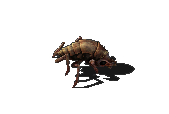 |
小型バイター | 最も弱いバイター。ハンドガンで容易に殺せる。
|
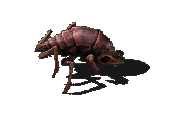 |
中型バイター | 小型バイターよりも強力で素早い。弱いプレイヤーを苦しめ、殺すことさえある。
抵抗:
|
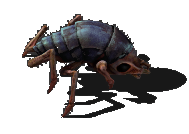 |
大型バイター | 小火器に強く、危険。壁越しに攻撃し、向こう側の物体に命中させることができる。
抵抗:
|
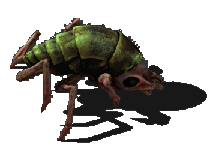 |
ベヒーモスバイター | 極めて耐久性が高く、最強の兵器を除き、小火器ではほとんど歯が立たない。壁越しに攻撃し、向こう側の物体に命中させることができる。
抵抗:
|
スピッター
スピッターはバイターとよく似ており、進化因子が増えるにつれて、少しだけ遅れて登場する。 バイターとの主な違いは範囲攻撃である。予測照準を使い、敵に向かって酸の流れを噴射し、地面に当たったところに酸の水たまりを残す。 スピッターの狙い撃ちにより、酸の流れは急に歩く方向を変えたり、立ち止まったりすることでかわすことができる。[1] 酸の噴射も酸の水たまりも一定時間の間ダメージを与え、プレイヤーや車両を減速させる。このゲームのほとんどのエンティティは他のダメージタイプ(タレットやアーマーを含む)よりも酸への耐性がかなり低いため、スピッターはプレイヤーとその工場に対して効果的に強力である。 行動やサイズの分類はバイターと同じだが、体力は普遍的に低く、爆発ダメージのみに抵抗力があり、物理ダメージの抵抗力はない。
ワーム
ワームはバイターやスピッターの自然な味方であり、近づけばスピッターと同様の攻撃でプレイヤーを攻撃する。ワームは静止したタレットのように振る舞い、攻撃者の後を追うことはない。 ワームやワームが守る巣からプレイヤーを遠ざけるために、高いダメージ、大きな射程距離、拡散ダメージに頼っているが、これらの利点のどちらかを克服することもできる。他の敵とは異なり、彼らは火にも強い。彼らはプレイヤーに向かって酸を吐き、地面に酸の水たまりを残してプレイヤーや乗り物にダメージを与えることができる。ただし、配置された建物やタイルは酸の水たまりの影響を受けないが、酸の噴射によるダメージは通常通り受ける。
ワームには4つのサイズがあり、サイズが大きくなるほどパワーが増す。バイターやスピッターのように、ベヒーモス、大型、中型のワームは進化因子に影響される。ワームは敵の拡大時に一定の進化倍率の条件を満たしたときのみ生成される。中型ワームは0.3、大型ワームは0.5、ベヒーモスワームは0.9である。これらの進化倍率を下回ると、ワームはマップ生成でしか作成できなくなる。マップ生成では、ゲームはスタート地点から遠く離れたところに上位層のワームを制限する。プレイヤーがスタート地点から離れれば離れるほど、ワームは強くなる。
| 画像 | 説明 |
|---|---|
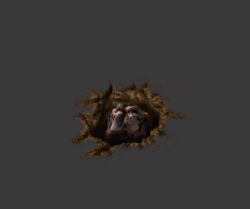 |
ワームの攻撃動作 |
巣
バイターやスピッターの発生源。巣自体は一般的に無防備だが、時間が経つにつれて放たれる敵はプレイヤーや近くのタレットの注意をそらすガードとして効果的に機能する。汚染にさらされた巣は、汚染を利用して敵を攻撃に参加させる。戦闘に参加していない敵は保護のために最も近い巣を探すかもしれない。
巣は火に非常に強い抵抗を持ち、それ以外は一般的に中型のワームよりも回復力がある。
| 画像 | 名前 | 説明 |
|---|---|---|
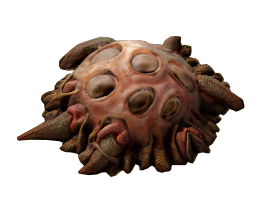 |
バイターの巣 |
抵抗:
|
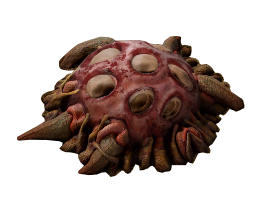 |
Spitter's nest |
抵抗:
|
拡大
4~60分おきに、5~20匹のバイター/スピッターのグループが拠点を離れ、グループのメンバー数と同じ数のワーム/巣からなる新しい拠点を作る。このグループは既存の拠点から3~7チャンク離れた適切な場所を探す。敵の拡大間隔はグローバルで、敵の進化が高いほど平均して短くなる。さらに、進化が高いほど、グループは平均して大きくなる。
適切な場所を見つけると、グループ内のバイター/スピッターはそれぞれ死亡し、新しい巣やワームを形成する。新しい巣やワームを形成すると、邪魔なものはすべて破壊され、その中には拡張グループのメンバーも含まれることがある。ワームや巣を作るために各メンバーが犠牲になる間には遅延があるため、グループのサイズにもよるが、拡張グループから新しい拠点を作るにはかなりの時間がかかる。中型ワームは現在の進化が0.3より高い場合のみ、大型ワームは現在の進化が0.5より高い場合のみ、ベヒーモスワームは現在の進化が0.9より高い場合のみ形成される。ゲームは、進化係数が十分に高ければ、新しいバイターの巣、スピッターの巣、小型ワーム、より大型のワームのいずれを形成するかをランダムに選択する。[2]
防衛
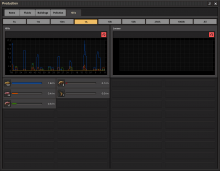
巣はバイターやスピッターを自由に生み出す。しかし、バイターやスピッターは、工場の汚染雲が巣に到達した場合のみ、プレイヤーの工場に積極的に攻撃を仕掛けてくる。なぜなら、汚染はバイターやスピッターを次の攻撃に参加させるために消費されるからだ。1~10分おきに(ランダム)バイターが攻撃を開始する。その時間までにすべてのバイターがランデブーポイントに到着していない場合、はぐれたバイターのために最大2分追加で待機する。攻撃はその後、地形を考慮しつつ、障害となりうるプレイヤー・エンティティ(防壁など)は考慮せず、可能な限り最短の経路で目標に向かう。
その障害物の周囲に明確な道があれば、バイターは迂回しようとする。明確な通路がない場合、あるいは明確な通路が本来のコースから大きく逸れることになる場合、バイターは通り抜けるために邪魔なものは何でも攻撃する。バリアに沿って一定間隔で迷路を作ることで、タワーディフェンスとは似て非なる試練をバイターに与えることができる。
しかし、バイターが軍事ユニットや構造物の近くに来た場合、それらを優先し、代わりにそれらを即座に攻撃しようとする。そして、可能であれば、あまり大きな迂回をせず、可能な限り最短距離で新しい目標に到達しようとする。
進化
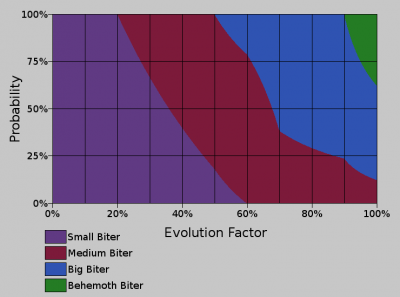
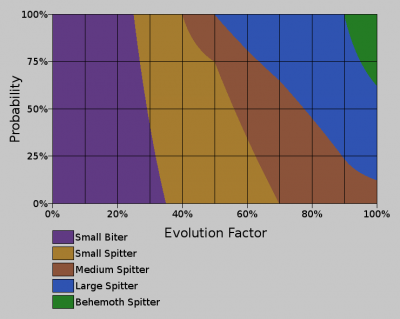
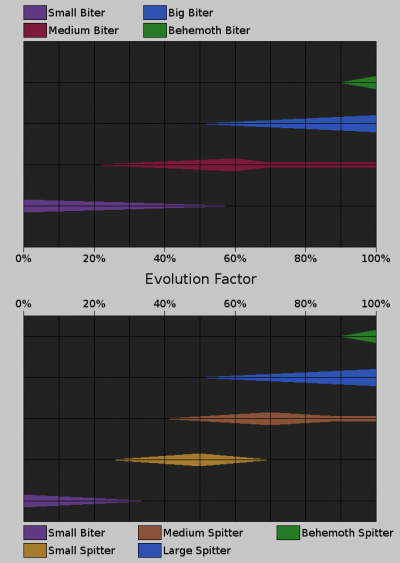
進化因子はグローバル変数で、どんなバイターが生まれるかを決定する。この変数は以下のコマンドで開発コンソールで確認できる(実績は無効にならない)。
/evolution
進化因子は0(まったく進化していない)から1(最大進化)まである。進化因子は増加するのみである。
This command also provides percentages for the three sources; each one is the percent of the (unsquashed) total evolution that is contributed by that source.
このコマンドはまた、3つのソースの割合を提供する。それぞれのソースは、そのソースによって貢献された(潰されていない)全進化のパーセンテージである。
どの種類のバイターを産卵させるかを選ぶだけでなく、進化因子も産卵間隔に影響する。この間隔(敵の発生源によって決まる発生クールダウン)は 360 (進化因子 0) から 150 (進化因子 1) ゲームティック (= 6 から 2.5 秒)になる。
増える方法
The evolution factor is increased by three kinds of events:
- The passage of time very slightly increases the evolution factor.
- The global pollution production increases the evolution factor.
- Destroying nests significantly increases the evolution factor.
The default settings are:
| Source per | Variable in enemy_evolution
|
Evolution increase | Pollution equivalent |
|---|---|---|---|
| Second | time_factor |
0.000004 | 267/minute |
| Destroyed enemy spawner | destroy_factor |
0.002 | 2222 |
| 1 Pollution unit | pollution_factor |
0.0000009 | 1 |
These values can be set during world generation: the values in the dialog box are multiplied by 10^-7 for time and pollution, and 10^-5 for spawner destruction. In game, they can be found in game.map_settings.enemy_evolution, though checking or modifying them is considered using cheats.
Pollution production is the total pollution produced by buildings, not the pollution spreading on the map, so it is not reduced by trees or other absorbers. e.g. : 10 boilers produce 300 pollution in one minute, raising the evolution factor by around 0.00027 in that minute.
After totaling up all the evolution from these sources, this quantity is squashed to fit in the range [0, 1) by applying evolution_factor = total_evolution / (1 + total_evolution).
Equivalently, marginal increases in evolution are reduced by multiplying the increase by (1 - evolution_factor)². So for instance destroying enemy spawners in the beginning of the game results in increase of evolution factor by 0.002 while doing this when the evolution factor is 0.5 the increase is only 0.0005.
This also means that the evolution factor approaches 1 asymptotically - generally, increases past 0.9 or so are very slow and the number never actually reaches 1.0.
| Evolution factor | Pollution equivalent | Appearance |
|---|---|---|
| 10% | 123k | |
| 20% | 278k | Medium Biter |
| 25% | 370k | Small Spitter |
| 30% | 476k | |
| 40% | 741k | Medium Spitter |
| 50% | 1.111M | Big Biter, Big Spitter |
| 60% | 1.667M | |
| 70% | 2.592M | |
| 80% | 4.444M | |
| 90% | 10M | Behemoth Biter, Behemoth Spitter |
| 95% | 21M | |
| 99% | 110M |
進化因子による発生確率
The probability charts show the chances of each type of biter/spitter for each spawner at all evolution levels.
発展: 進化因子の構成と計算
This section has charts plotting the individual evolution factor components and discusses possibilities for manually estimating the evolution factor.
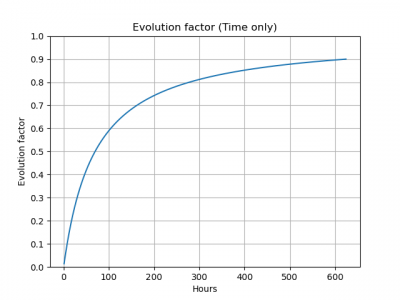
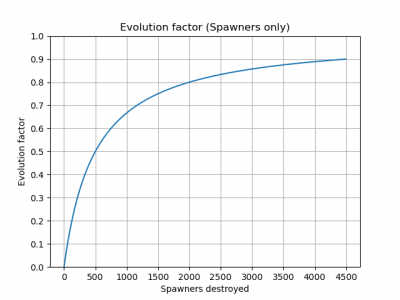
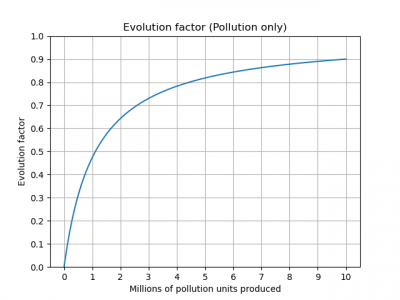
Notes
- Data from version 1.1.50.
- All charts end at approximately an evolution factor of 0.90.
- The calculation steps for time and spawner kills match those used by the game, so these charts should be accurate. The pollution chart assumes a pollution production of 1000 units per second, and due to the recursive nature of the chart values will slightly diverge at different pollution rates. The effect of this is negligible for any reasonable amount pollution production, however.
- Given that the game reports the actual evolution factor (console:
/evolution) whenever the player wishes, these charts are intended primarily to help estimate the impact of planned base expansions and similar activities on the evolution factor's future development.
Comments
These charts (click to enlarge) represent the situation where each evolution factor component (time, pollution, destroyed spawners) is the only component contributing to the evolution factor in that entire game. They are therefore not realistic, as in a typical game all three components will contribute, some at varying times and intensities.
Because of how contributions to the evolution factor (EF) are calculated (multiplied by (1 - current EF)), it is not possible to simply add the values indicated by these charts for a game's time passed, pollution generated, and / or spawners destroyed so far to retrieve the total evolution factor.
For example, if 24 hours have passed (single-component EF =~ 0.25), 200,000 pollution units were released (single-component EF =~ 0.15), and 400 spawners were destroyed (single-component EF =~ 0.45), the actual evolution factor will not be (0.25 + 0.15 + 0.45 =) ~0.85.
However, the evolution factor will always be less than the sum of all individual components as indicated by these charts, and at least as high as the highest individual component. Thus, using the values from above, the EF will be at least 0.35 and less than 0.85. A smarter approach is required to compute the current evolution factor.
Individual components
The individual components of evolution can be approximated from /evolution:
Given the evolution factor, the unsquashed evolution is unsquashed = evolution_factor / (1 - evolution_factor). Multiply this by the percentage for a given component to get its approximate unsquashed contribution. Of course, total pollution and spawner kills can also be found on the production statistics screen, and time passed can be found using the /time command, so it's not fully necessary.
The actual factors can be found in game.forces.enemy.evolution_factor_by_time, ...evolution_factor_by_killing_spawners, and ...evolution_factor_by_pollution, if you don't mind disabling achievements.
ギャラリー
-
The player near some enemy nests and worms.
-
The player among acid puddles created by attacking worms.
-
Both the player and some buildings getting attacked by biters.
-
Enemy nests seen in a map generation preview (deathworld setting).
-
Line of gun turrets defending against biters.
-
Enemies seen at the title screen.
